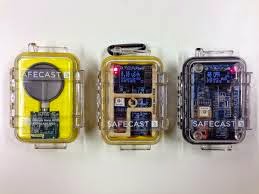Hacking Science: TIME Community and Democracy of Developers
An interesting dissertation serendipitously popped up on my laptop screen this morning -- "Hacking Science: Emerging Parascientific Genres and Public Participation in Scientific Research."
The dissertation appears relevant to a number of my activity areas, stating in its abstract:
A central figure in the "Hacking Science" paper is the Safecast radiation monitoring project, a high profile citizen science effort that emerged from a critical mass of people in the TIME community (tech, innovator, maker, entrepreneur). One of my activities is connecting and building the TIME community of northeast Wisconsin (and other places, like Humboldt County, CA). The TIME community consists of like-minded and complementary-minded people who can also be described as doers and are sometimes called creatives, people who don’t watch much tv or participants, not spectators. The "Hacking Science" dissertation very directly speaks about many activities in which the TIME community is involved."...I trace the history of this distinction between expert and public science communication, looking back to early scientists, amateur scientists, and forward to the emerging trends in citizen science. I also uncover an emerging sphere, both within and beyond citizen science, where hackers have become involved in scientific research. I trace this phenomenon to the emergence of “hackerspaces.”...boundaries between expert and public spheres of science communication are eroding..."
Safecast Radiation Monitors
Ashley Kelly's "Hacking Science" dissertation also appears highly relevant to the democracy of developers concept being promoted by Wearable World, as described in this post on ReadWrite:
"If software is eating the world, as Netscape cofounder and technology investor Marc Andreessen likes to say, then hardware is the plate from which it feasts. Devices are the best expression of the ethereal services that spew data into our increasingly digital universe. And increasingly, they will be as hackable and fungible as software code. For this world, we will need vastly more people who are proficient in code, and we will need people who look nothing like the bulk of the software profession today. Redg and I call this emerging group the "Democracy of Developers." ReadWrite will champion them. In 2014...professional software developers outnumbered hobbyists 11 million to 7.5 million. I believe those numbers will soon flip. I predict that we will have vastly more practitioners of code who pursue it out of passion, as a sideline, as an entrepreneurial dream, or simply as a skill they use to make their way in the world."I was thinking about the democracy of developers issue this past Saturday at the NEWCodeCamp. The camp had over 250 registered participants, most of whom were coders who work primarily in the Microsoft world. One of the sessions at the camp was about the Internet of Things (IoT), and Jason Young talked about many different aspects of the coding he has done in the IoT. While I was listening to Jason's IoT session and a couple of the other camp sessions, I thought about how Microsoft's dominance in business and general computing is becoming less of a monopoly stranglehold and how Microsoft and developers who focus on MS coding tools are starting to become more open and more involved with non-MS code. Many of the non-MS coders I know weren't even aware of the NEWCodeCamp or NEWDUG, a northeast Wisconsin organization which previously labeled itself a .NET user group. The reverse is also true, because people I talked to at the NEWCodeCamp had no idea what BarCampGreenBay or Startup Weekend Green Bay were, and probably don't know about Digital Fertilizer or OpenCoffee. So connecting those two separated communities will help make the northeast Wisconsin developer community more open and more aware of opportunities to learn, share and collaborate. As those MS coders get involved in more events that are participant driven and open, the democracy of developers will get bigger, better and more interesting.
I'm also interested in "Hacking Science" because it appears to relate to:
- The Distributed Hacker/Maker Network (DHMN) and Appleton Makerspace
- Civic hacking and the upcoming DHMN Civic Hackathon -- Appleton 2015
- Coworking spaces that engage with civic activists, like Gangplank
- Connecting professionals and work in "the new world of work" with activities like Staffup Weekend and Reverse Pitch
*****




0 Comments:
Post a Comment
<< Home